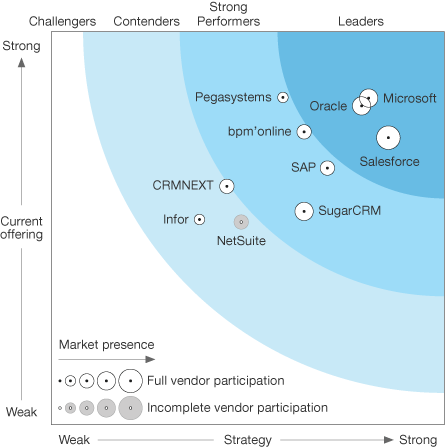Forrester Gives Dynamics 365 Highest Possible Score for CRM Product Vision
Forrester gives Dynamics 365 highest possible score for CRM product vision! Read ahead to learn how Forrester came to this conclusion.
Table of Content
As a leader in a Microsoft-focused technology firm, it isn’t a big leap to say I’m a fan of Dynamics 365 for sales, marketing and PSA. I’m clearly not alone. In addition to 10’s of thousands of buyers, it looks like the analyst community is giving Microsoft’s Dynamics 365 platform high marks.
Microsoft recently shared this new report from Forrester, titled “The Forrester Wave: Sales Force Automation Solutions, Q2 2017”. In the report, Forrester details how buyers are reshaping modern selling and the tools they’re utilizing. Forrester wrote, “With all the hype around artificial intelligence (AI) and machine learning, Microsoft shows considerable maturity in both its execution and vision for how advanced analytics will transform selling. Customers rate Microsoft’s pace and penchant for innovation very highly. The potential around analytics only improves with its acquisition of LinkedIn.”

Forrester evaluated solutions for 10 of the leading CRM vendors across a number of criteria and gave Dynamics 365 a near perfect score for their product vision. The 10 vendors included companies like NetSuite, Salesforce, SAP and Oracle to name a few. The evaluation included analysis and scoring across 35 criteria and each vendor had to:
Forrester used a combination of three data sources to assess the strengths and weaknesses of each solution.
Vendor surveys. Forrester surveyed vendors on their capabilities as they relate to the evaluation criteria. Once they analyzed the completed vendor surveys, they conducted vendor calls where necessary to gather details of vendor qualifications.
Product demos. They asked vendors to conduct demonstrations of their products’ functionality and used findings from these product demos to validate details of each vendor’s product capabilities.
Customer reference calls. To validate product and vendor qualifications, Forrester also conducted reference calls with three of each vendor’s current customers.
It seems as if the wins just keep coming for Microsoft and the Microsoft customer ecosystem. Advancements in the product, integration with ERP, marketing and LinkedIn offer deep, demonstrable value for customer seeking to sell and service more effectively. In an age where “digital transformation” is fast-becoming the most common path to a competitive edge, it seems like they’re on the right track.
In addition to becoming one of the fastest-growing sales, marketing and customer services solutions, Dynamics 365 has made inroads in a long list of industry and specialty areas. The architecture lends well to free-thinking business leaders and technologists.
Our company is well-know for helping project-driven companies, so Dynamics 365 Project Service Automation is a natural fit for many of our clients.
When is Dynamics 365 for Project Service Automation (PSA) the right fit?
March 11, 2017 by @Robbie Morrison
“Because it is based on a CRM platform, the solution is fairly flexible and many per-company customizations can be created without back-end programming. Integration with Office 365 and other Microsoft tools is robust as well. However, this flexibility comes with a price. While the solution provides strong collaboration benefits between sales and delivery resources, it is most effective for companies with smaller delivery teams and less complex projects.
Examples of companies that might benefit from Dynamics 365 for Project Service Automation are marketing and media firms, light management/consulting firms, smaller IT services firms, and many other white-collar consulting firms. Although I’m calling out smaller companies, it could be a great fit for large companies as long as their project delivery is still fairly simple.
Think about a company that provides creative design for television ads vs. a consultancy that deploys large, integrated ERP systems. The latter may take anywhere from 6 months to 3 years and require multiple milestones, different skill-sets and formal call-center or on-site support. Other business that may struggle with CRM-based PSA are Architecture and Engineering, Construction, Software Publishers or even specialty manufacturers.”
Talk to us about how Velosio can help you realize business value faster with end-to-end solutions and cloud services.